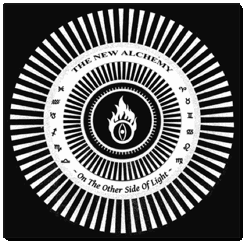 The New Alchemy creates transformational music from simple elements: voices, guitars, organs, and saxophones. The music moves deliberately, contrasting an intense, blistering, squall one might associate with screams from human sacrifice, with an airy, spacious, psychedelia.
The New Alchemy creates transformational music from simple elements: voices, guitars, organs, and saxophones. The music moves deliberately, contrasting an intense, blistering, squall one might associate with screams from human sacrifice, with an airy, spacious, psychedelia.
Per Svensson and Ebbot Lundberg share vocals, guitars, and keyboards throughout this album. Part of the charm of their vocals comes from stony repetition of phrases and some from the second-language "otherness" of their English. There are also passages of spoken word incantation which add genuine strangeness rather than unintentional hilarity. Guitars shift backwards and forwards, keyboards strike incongruent shapes, and Max Gustafsson’s saxophone at times closely resembles another fuzzed out guitar. The wildest sections are the short opening "Solar Eclipse" and the slowly evolving 24 minute closer "Extra Terrestrial Blues." Such an extended piece could easily be self-indulgent in the wrong hands but here is not a moment too long.
Between these extremes, several tracks reference very well known late 1960s psychedelia and 1970s space rock. "Creatures" resembles an energetic channeling of The Misunderstood or 13th Floor Elevators. Clay Ketter joins on drums for the title track; a stretched-out and bombastic piece with vocals that are sometimes repeated back in a slightly dumb and delirious fashion. (It reminds me of the creepy way the character of Dim in A Clockwork Orange repeats Alex's singing during the gang home-invasion scene.) "Silver Chain" has a more threatening atmosphere, including such found sound as church bells, with hints at the coming sonic, skin-blistering, wind-tunnelesque, weirdness of "Extra Terrestrial Blues."
Not that the music is doom laden or intensely dark and sludgy. Rather it is cathartic, ritualistic and invigorating. I shouldn’t be surprised if The New Alchemy take their name from Alan Watts’ 1960 essay which discusses the quest to turn base metal into gold as being more a symbol of the quest for spiritual immortality. For Watts this may have been through a chemical elixir, and less literally about eternal life than the development of consciousness outside of the restrictive realm of time. On The Other Side of Light takes a different approach to something broadly similar.
Read More

